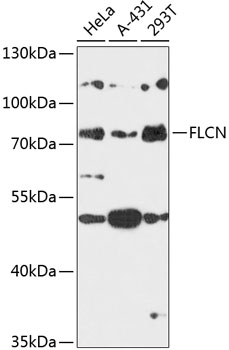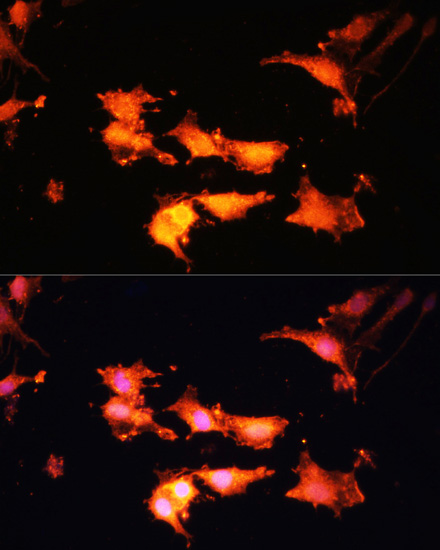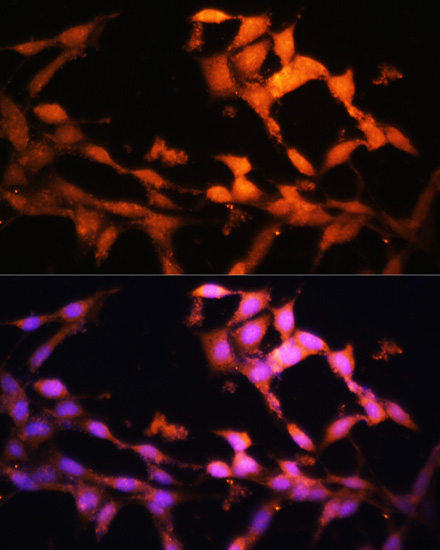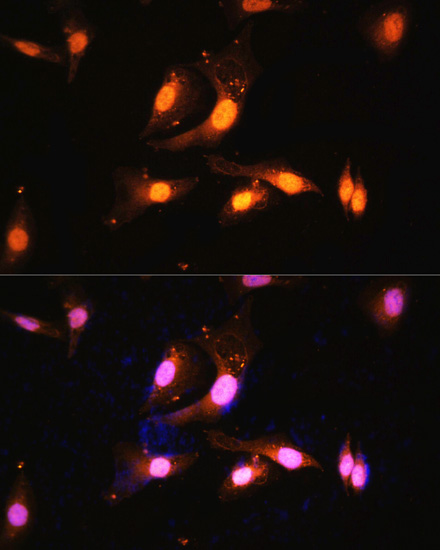Anti-FLCN Antibody (CAB14521)
- SKU:
- CAB14521
- Product type:
- Antibody
- Reactivity:
- Human
- Mouse
- Rat
- Host Species:
- Rabbit
- Isotype:
- IgG
- Antibody Type:
- Polyclonal Antibody
- Research Area:
- Cell Biology
Description
| Antibody Name: | Anti-FLCN Antibody |
| Antibody SKU: | CAB14521 |
| Antibody Size: | 20uL, 50uL, 100uL |
| Application: | WB IF |
| Reactivity: | Human, Mouse, Rat |
| Host Species: | Rabbit |
| Immunogen: | Recombinant fusion protein containing a sequence corresponding to amino acids 1-130 of human FLCN (NP_653207.1). |
| Application: | WB IF |
| Recommended Dilution: | WB 1:500 - 1:2000 IF 1:50 - 1:200 |
| Reactivity: | Human, Mouse, Rat |
| Positive Samples: | HeLa, A-431, 293T |
| Immunogen: | Recombinant fusion protein containing a sequence corresponding to amino acids 1-130 of human FLCN (NP_653207.1). |
| Purification Method: | Affinity purification |
| Storage Buffer: | Store at -20°C. Avoid freeze / thaw cycles. Buffer: PBS with 0.02% sodium azide, 50% glycerol, pH7.3. |
| Isotype: | IgG |
| Sequence: | MNAI VALC HFCE LHGP RTLF CTEV LHAP LPQG DGNE DSPG QGEQ AEEE EGGI QMNS RMRA HSPA EGAS VESS SPGP KKSD MCEG CRSL AAGH PGYI SHDK ETSI KYVS HQHP SHPQ LFSI VRQA CVRS LS |
| Gene ID: | 201163 |
| Uniprot: | Q8NFG4 |
| Cellular Location: | Cytoplasm, Nucleus |
| Calculated MW: | 20kDa/37kDa/64kDa |
| Observed MW: | 75kDa |
| Synonyms: | FLCN, BHD, FLCL |
| Background: | This gene is located within the Smith-Magenis syndrome region on chromosome 17. Mutations in this gene are associated with Birt-Hogg-Dube syndrome, which is characterized by fibrofolliculomas, renal tumors, lung cysts, and pneumothorax. Alternative splicing of this gene results in two transcript variants encoding different isoforms. |
| UniProt Protein Function: | FLCN: a protein that is expressed in most tissues and that has no significant homology to other proteins. Involved in nutrient sensing through the AMPK and mTOR signaling pathways. Regulates lysosome function by promoting the mTORC1-dependent sequestration of transcription factor EB (TFEB). Required for the recruitment of mTORC1 to lysosomes by Rag GTPases. Amino acid depletion leads to its recruitment to the surface of lysosomes where it directly binds RagA, an interaction that is promoted by FNIP1. May be a tumor suppressor. Loss of function mutations cause Birt-Hogg-Dube syndrome (BHD), a disease characterized by fibrofolliculomas (hair follicle tumors), and predispositions for renal carcinoma, pneumothorax, and pulmonary cysts. These symptoms are similar to those that occur in TSC or tuberous sclerosis complex, suggesting the involvement in the same pathways as TSC1. Belongs to the folliculin family. 3 isoforms of the human protein are produced by alternative splicing. |
| UniProt Protein Details: | Protein type:Tumor suppressor Chromosomal Location of Human Ortholog: 17p11.2 Cellular Component: cilium; cytoplasm; cytosol; lysosome; midbody; nucleus; plasma membrane Molecular Function:protein binding; protein complex binding Biological Process: hemopoiesis; in utero embryonic development; intercellular junction assembly; negative regulation of cell growth; negative regulation of cell migration; negative regulation of protein kinase B signaling cascade; negative regulation of Rho protein signal transduction; negative regulation of TOR signaling pathway; negative regulation of transcription from RNA polymerase II promoter; positive regulation of apoptosis; positive regulation of autophagy; positive regulation of cell adhesion; positive regulation of protein amino acid phosphorylation; positive regulation of TOR signaling pathway; positive regulation of transcription from RNA polymerase II promoter; positive regulation of transforming growth factor beta receptor signaling pathway; regulation of cytokinesis; regulation of histone acetylation; regulation of protein amino acid phosphorylation; regulation of TOR signaling pathway; TOR signaling pathway Disease: Birt-hogg-dube Syndrome; Colorectal Cancer; Pneumothorax, Primary Spontaneous; Renal Cell Carcinoma, Nonpapillary |
| NCBI Summary: | This gene is located within the Smith-Magenis syndrome region on chromosome 17. Mutations in this gene are associated with Birt-Hogg-Dube syndrome, which is characterized by fibrofolliculomas, renal tumors, lung cysts, and pneumothorax. Alternative splicing of this gene results in two transcript variants encoding different isoforms. [provided by RefSeq, Jul 2008] |
| UniProt Code: | Q8NFG4 |
| NCBI GenInfo Identifier: | 74751276 |
| NCBI Gene ID: | 201163 |
| NCBI Accession: | Q8NFG4.1 |
| UniProt Secondary Accession: | Q8NFG4,Q6ZRX1, Q96BD2, Q96BE4, A6NJJ8, |
| UniProt Related Accession: | Q8NFG4 |
| Molecular Weight: | 64kDa |
| NCBI Full Name: | Folliculin |
| NCBI Synonym Full Names: | folliculin |
| NCBI Official Symbol: | FLCN |
| NCBI Official Synonym Symbols: | BHD; FLCL |
| NCBI Protein Information: | folliculin |
| UniProt Protein Name: | Folliculin |
| UniProt Synonym Protein Names: | BHD skin lesion fibrofolliculoma protein; Birt-Hogg-Dube syndrome protein |
| Protein Family: | Folliculin |
| UniProt Gene Name: | FLCN |









